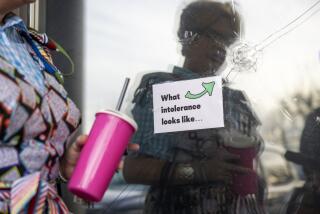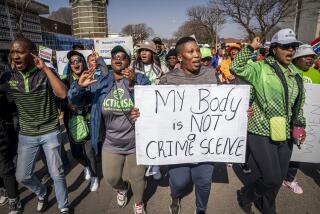Ethnic Albanians Demand Jobs Back at Radio and TV Station
It was just after 3 p.m. on July 5, 1990, Miradije Kuqi recalls, when a Serbian police officer walked into the control room of Kosovo’s major radio and television station, pointed an AK-47 automatic weapon at the technician’s throat and demanded to know why the Serbian news out of the Yugoslav capital, Belgrade, wasn’t on yet.
It’s time for the Albanian-language news, she replied.
That was the last time news of the ethnic Albanian community in Kosovo aired. The Serbs expelled several hundred ethnic Albanian workers from Radio and TV of Pristina, which had featured programming for the province’s many ethnicities, including majority ethnic Albanians and minority Serbs, Turks and Gypsies.
The Serbian employees--who made up about 15% of the station’s 1,350 employees at the time--took over. Since then, the station has been used as a propaganda organ for Yugoslavia’s Serbian-dominated government.
On Thursday, a few hundred ethnic Albanian former employees converged at the front door and demanded their jobs back.
The Serbs refused, brandishing guns. British troops patrolling this provincial capital were called in to mediate.
It was a scene that is likely to be repeated in the coming weeks at dozens of institutions around Kosovo, the war-scarred province of Yugoslavia’s dominant republic, Serbia. Ethnic Albanian workers, emboldened by the presence of NATO-led peacekeepers and a fledgling democratic government being created by the U.N., will try to undo Kosovo’s long-standing ethnic apartheid.
In the early 1990s, Kosovo Albanians were expelled by the Serbian-led government from their jobs at most government agencies, schools, hospitals and corporations, though they made up an estimated 90% of the province’s prewar population of 2 million.
For those workers, the decade has been tough. They tried running private shops or businesses, one of their few options to replace once-steady paychecks.
Qazim Oruqi, 59, who had been the chief editor of the radio station’s music programs for both Serbs and ethnic Albanians, barely managed to survive while trying to replace the paycheck he lost. His subsequent ventures--opening a store, playing music in bars, even repairing shoes--failed.
“It was impossible for Albanians to profit on anything,” he said Thursday.
Putting the system back together equitably won’t be easy, particularly since there is no judicial or arbitration system in place in Kosovo. The Serbs who have remained in Pristina--and there are many--want to keep their jobs, and representatives from the North Atlantic Treaty Organization and the United Nations say they are committed to establishing a multiethnic society.
But tolerance is in short supply. Many ethnic Albanians say it will be impossible to work with Serbs.
“Here was the nest that supported [Yugoslavian President Slobodan] Milosevic the most--ordinary journalists, managers, editors,” said Selim Arifi, 59, formerly the chief news editor for Albanian-language radio programming at Radio and TV of Pristina. “You have to know these were the journalists who always supported the war against the Albanians.”
Freedom of the press was nonexistent. Once taken over by the Serbs, the station stopped reporting about mass rallies for Kosovo independence or about ethnic Albanians shot by police or the military, said Nexhmedin Shehu, 53, a former senior official in the TV division.
If a similar situation existed in the United States, it might take armies of lawyers to sort through everyone’s claims. In the make-it-up-as-you-go-along rules that now apply in Kosovo, the task has fallen to peacekeeping forces following the withdrawal of Yugoslav police and troops from the province as part of the peace accord that ended NATO’s 11-week bombing campaign.
In fact, it will be peacekeepers ordinarily responsible for dealing with the news media who will be leading negotiations between the Serbs and three representatives of the station’s former employees.
The talks are due to resume today and are likely to take a “long time--all day and night,” said one British soldier trying to disperse the angry crowd, which scattered about two hours after the incident.
“We are all traumatized,” one former worker at the station shouted to the crowd as he appealed for calm. “The last 10 years we have been under all kinds of stress because we are frustrated. But this is the day we’ve waited for for 10 years.”
More to Read
Start your day right
Sign up for Essential California for news, features and recommendations from the L.A. Times and beyond in your inbox six days a week.
You may occasionally receive promotional content from the Los Angeles Times.






